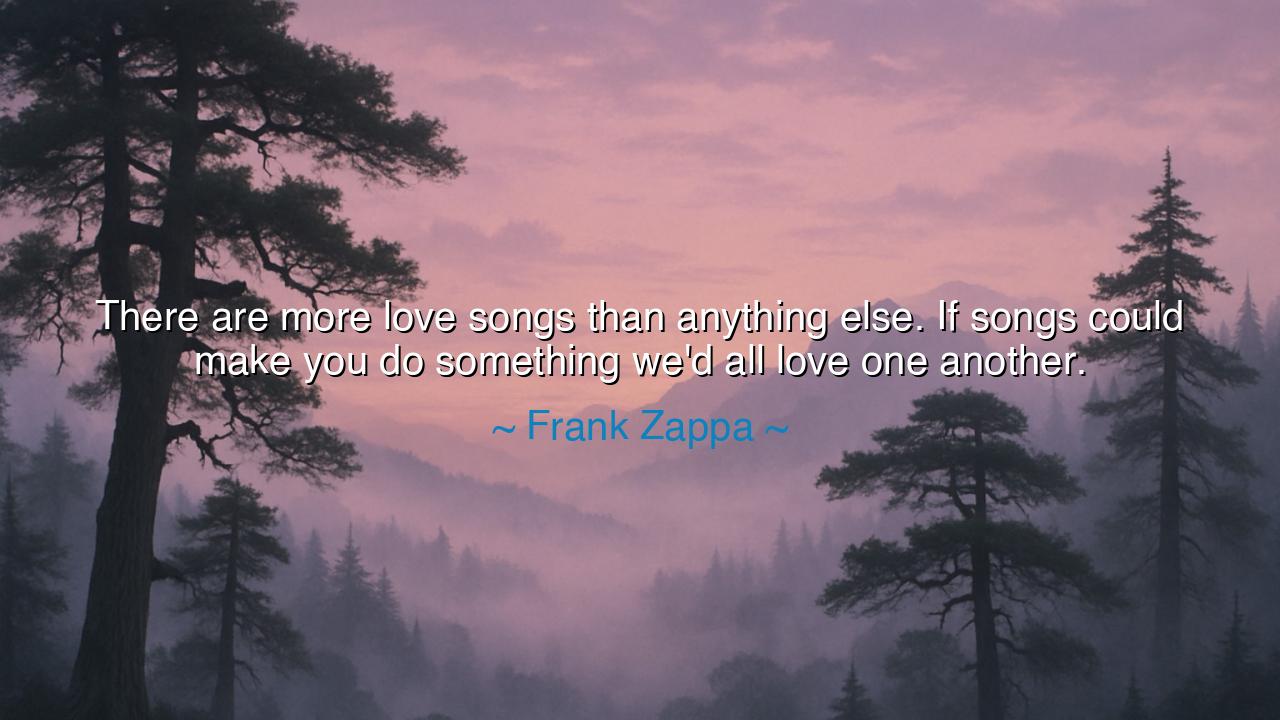
There are more love songs than anything else. If songs could
There are more love songs than anything else. If songs could make you do something we'd all love one another.






Frank Zappa, the sharp-tongued prophet of music and satire, once declared: “There are more love songs than anything else. If songs could make you do something we’d all love one another.” In these words lies both wit and lament, both humor and sorrow. For Zappa, who stood at the crossroads of art and critique, recognized a paradox: though the world is flooded with songs of love, human hearts remain divided by hatred, envy, and strife. He calls us to reflect on the difference between words sung and lives lived, between art as expression and action as transformation.
To note that there are more love songs than any other is to recognize the deepest longing of humanity. Across centuries and cultures, no theme has inspired more verses, more melodies, more sighs of the heart than love. From the troubadours of medieval Europe to the soul singers of modern America, the human spirit has always sought to capture love in rhythm and rhyme. And yet, Zappa challenges us with biting irony: if these songs carried power to shape behavior, the world would be filled not with wars and divisions, but with kindness and unity.
This paradox invites us to a deeper truth. Art is a mirror, not a master. Songs may reflect our desires, but they cannot force our deeds. Men may sing of compassion and still act with cruelty. Nations may raise anthems of unity while harboring divisions within. The danger Zappa warns against is the illusion that expression alone equals transformation. To write or to sing of love is not enough—it must be lived, embodied, and enacted in the choices of every day.
History provides countless examples of this tension. During the 1960s, the air was filled with protest songs and ballads of love. Bob Dylan sang of peace, The Beatles declared “All You Need Is Love,” and countless voices joined in harmony against war and hatred. Yet the wars still raged, injustice still lingered, and divisions still scarred the earth. The songs inspired, yes—but they did not by themselves change the human heart. As Zappa observed, if music alone carried the power to compel action, then love would already rule the earth.
And yet, let us not misunderstand his meaning. Zappa was not scorning music, nor mocking the love song itself. He was reminding us that songs are sparks, not flames; guides, not destinations. A song can awaken the heart, but it cannot carry the burden of change. That burden rests upon the soul of each listener, who must choose whether to let the inspiration of music transform into the action of life.
The meaning of this saying, then, is both sobering and empowering. It strips away illusions and commands responsibility. We cannot wait for art alone to heal the world, nor imagine that because we sing of love we have fulfilled it. True love requires more than melody—it requires courage, sacrifice, forgiveness, and daily labor. The world will not change because of the number of love songs written, but because of the number of hearts willing to live them out.
For those who hear this wisdom today, the lesson is plain. Do not be lulled into thinking that expression is enough. When you hear a song of love, let it stir you—but then act. Show kindness to a neighbor, forgive an enemy, speak gently to a friend, serve one in need. Practical steps follow: turn inspiration into deeds; let the poetry of art become the prose of your daily life. Only then will the countless love songs find their fulfillment, not in words, but in the lived harmony of humanity.
Thus Zappa’s words endure: “There are more love songs than anything else. If songs could make you do something we’d all love one another.” Let them remind you that the power of music lies not in commanding action, but in awakening the will. The true song of love must be sung not only by the voice, but by the life. And when enough lives take up that melody, the world itself will become the harmony that songs have long foretold.






AAdministratorAdministrator
Welcome, honored guests. Please leave a comment, we will respond soon